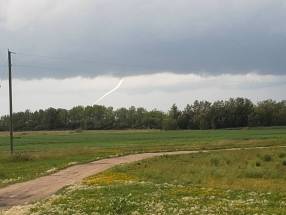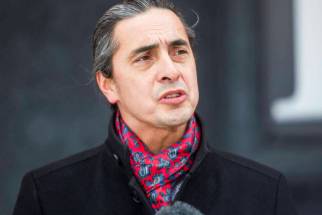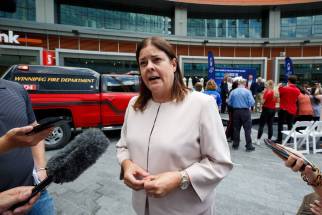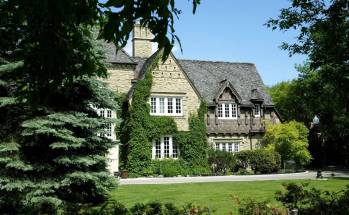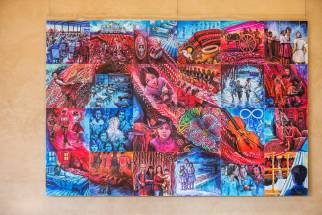Papal visit advances reconciliation dialogue
Read this article for free:
or
Already have an account? Log in here »
To continue reading, please subscribe:
Monthly Digital Subscription
$0 for the first 4 weeks*
- Enjoy unlimited reading on winnipegfreepress.com
- Read the E-Edition, our digital replica newspaper
- Access News Break, our award-winning app
- Play interactive puzzles
*No charge for 4 weeks then price increases to the regular rate of $19.00 plus GST every four weeks. Offer available to new and qualified returning subscribers only. Cancel any time.
Monthly Digital Subscription
$4.75/week*
- Enjoy unlimited reading on winnipegfreepress.com
- Read the E-Edition, our digital replica newspaper
- Access News Break, our award-winning app
- Play interactive puzzles
*Billed as $19 plus GST every four weeks. Cancel any time.
To continue reading, please subscribe:
Add Free Press access to your Brandon Sun subscription for only an additional
$1 for the first 4 weeks*
*Your next subscription payment will increase by $1.00 and you will be charged $16.99 plus GST for four weeks. After four weeks, your payment will increase to $23.99 plus GST every four weeks.
Read unlimited articles for free today:
or
Already have an account? Log in here »
Hey there, time traveller!
This article was published 03/08/2022 (1224 days ago), so information in it may no longer be current.
The words “historic” and “extraordinary” have been used to describe last week’s “pilgrimage of penance” visit to Canada by Pope Francis. But so have the words “incomplete” and “insufficient.”
The metrics of success are difficult to delineate, as the import and impact of the pontiff’s tour and associated pronouncements depend very much on individual perceptions, experiences and beliefs. But this much is clear: Pope Francis’s six-day Canadian tour has — productively, many would argue — altered the tone and trajectory of this country’s ongoing conversations regarding reconciliation.
While he apologized profusely — several times, in several Canadian settings — for the abuses and intergenerational trauma associated with Canada’s residential-school system, the Pope’s expressions of sorrow were related only to the harmful actions of individuals within the Roman Catholic church, and meticulously avoided addressing the institutional role of the church itself in the creation and execution of colonial policies that amounted to cultural genocide.
And speaking of the “G” word, it was particularly noteworthy to learn Pope Francis did, in fact, finally describe as genocide the aforementioned actions carried out by agents of the church in Canada’s residential schools.
“To take away children, to change the culture, their mindset, their traditions– to change a race, an entire culture … yes I (do) use the word genocide.”- Pope Francis
“To take away children, to change the culture, their mindset, their traditions — to change a race, an entire culture … yes I (do) use the word genocide,” he told reporters Friday during his flight from Iqaluit back to Rome after the completion of his Canadian tour.
But as with so many other aspects of the so-called penitential pilgrimage, the statement was shaded with a subtextual “but” — in this case, the fact it was issued essentially as an afterthought to the trip itself, and that the Pope’s tepid explanation for not invoking the term genocide during his face-to-face meetings with Indigenous peoples was that he “did not think” of it at the time.
Regardless of the unfortunate timing of the Pope’s eventual employment of the term, one would hope the gesture will make it easier for those in Canada’s political class to state freely that genocide was both the intention and, in many respects, the consequence of colonial policies such as the residential school system.
There is much more to be said, because there is much more to learn — as evidenced by the coincidental story this week regarding the discovery in Rome, by the head archivist for the Winnipeg-based Centre for Truth and Reconciliation, of a previously unknown trove of images, manuscripts and personnel files related to residential schools in Canada.
“It did have a very historic feeling to it, very profound.”- Raymond Frogner
“It did have a very historic feeling to it, very profound,” Raymond Frogner said of what he found while examining the archives of the Missionary Oblates of Mary Immaculate last month. The Oblates operated 48 residential schools in Canada, and Mr. Frogner estimates there are as many as 1,000 photographs in the collection, which could be important to understanding what happened inside those residential schools.
The images, said Mr. Frogner, could allow his organization to work with Indigenous communities to identify the children in the images and pinpoint where they were at certain points in their residential-schools ordeal.
Records such as those, as well as any other related documents held by the Vatican or any other of the Catholic church’s affiliated agencies, should be turned over to Canadian authorities so they can be added to this country’s knowledge regarding the actions in and legacy of the residential school system.
Pope Francis’s time on Canadian soil will likely be remembered for his many carefully chosen and impactful words. How they translate into action will be the true measure of his visit’s value.



